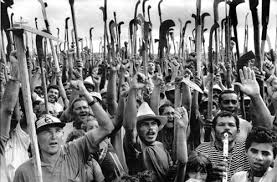Community Media in Venezuela
An interesting [Sujatha Fernandes, "Growing Movement of Community Radio in Venezuela," December 24, 2005] article on community radio stations in Venezuela which have proliferated since Chavez came to power. They appear to share much of the spirit of the Indymedia movement but perhaps with much greater integration into the communities in which they are based (little usage except by a small minority of leftists has been a serious limitation of the Indymedia centers I've known). The article notes that newly forming radio stations have often faced bureaucratic hurdles from the Chavez government but have been allowed to remain independent and critical, a crucial feature facilitated by basing their financial reliance on small local businesses.
But community radio stations have sought to retain their autonomy from the state, which is apparent not only in their struggles with state bureaucrats to ensure authorization, but in their willingness to criticize the Chávez government on important issues. In March 2005, activists of ANMCLA came together with social organizations and indigenous groups to protest the plan of the government to increase the extraction of coal in the oil-rich state of Zulia. The protesters pointed out that the plans would increase water contamination and health risks for the mostly indigenous population of the region who depend on scarce water supplies. They argued that the proposal violates the Kyoto Agreement and several articles of the Bolivarian Constitution that guarantee a clean and safe environment, and protection of indigenous resources. Although the outcome is still uncertain, community media activists have shown their willingness to criticize the government when community interests are at stake.
If we trust the author's observations, the following passage is quite revealing, illustrating not only the differences in content between community media and corporate programming, but the differing impulses they produce in people:
The community media gives voice to a range of groups and members of the community. There are talk shows, educational programs, cultural shows, sports segments, local history programs, children’s shows, cooking shows, and a variety of music programs, including salsa, bolero, hip-hop, rock, and llanero or country music. There are also social and political programs, which attempt to make visible certain issues such as race. Afro-Venezuelan radio journalist, Madera, has a program on Radio Negro Primero, which he says is “For black men and women.” These kinds of programs do not have space within the state-run media, and certainly have never been a possibility in the private media.
Community media broadcasts are a stark contrast to the stock fare of reality tv shows, soap operas, and game shows continually churned out by the private media. This latter programming nurtures a culture of consumerism that has grown along with globalization. Middle class youth compare expensive watches and brand name sneakers in the walkways of the prestigious Centro Sambil shopping mall in the eastern zone of Chacao. Wealthy parents hire companies to supply arcade video games to entertain their kids at children’s parties. Meanwhile, increasing numbers of barrio youth in the west of Caracas are creating their own forms of leisure that reflect much more closely the new community activism that has become a part of their lives.



0 Comments:
Post a Comment
<< Home